By Robert St. Martin
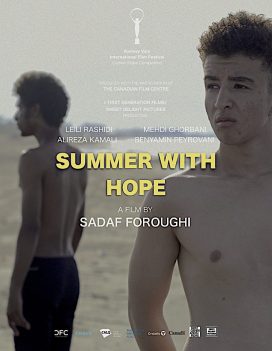 Los Angeles, CA (The Hollywood Times) 3/27/23 – Sunday mid-day at the TLC Chinese-6 Theatres in Hollywood was a screening of Sadat Foroughi’s “Summer With Hope” (“تابستان با امید,” Canada, in Persian, 2022) in the line-up of this year’s Outfest Fusion Film Festival 2023. This film by Sadat Foroughi is an Iranian tragedy in the Persian language shot in Iran and financed from Canada. You might wonder why this film was selected for inclusion in Outfest Fusion, the LGBTQIA+ People of Color Festival in Los Angeles. The film demands viewers’ patience as it probes strange hostilities around a swimming competition for Iranian teenager boys, with its slow reveal and final sense of tragedy.
Los Angeles, CA (The Hollywood Times) 3/27/23 – Sunday mid-day at the TLC Chinese-6 Theatres in Hollywood was a screening of Sadat Foroughi’s “Summer With Hope” (“تابستان با امید,” Canada, in Persian, 2022) in the line-up of this year’s Outfest Fusion Film Festival 2023. This film by Sadat Foroughi is an Iranian tragedy in the Persian language shot in Iran and financed from Canada. You might wonder why this film was selected for inclusion in Outfest Fusion, the LGBTQIA+ People of Color Festival in Los Angeles. The film demands viewers’ patience as it probes strange hostilities around a swimming competition for Iranian teenager boys, with its slow reveal and final sense of tragedy.
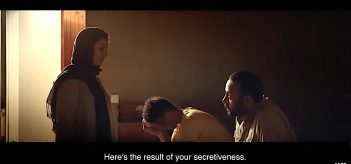 The second film in Sadaf Foroughi’s planned trilogy, “Summer With Hope” examines the pressure-filled expectations of a new generation, for both them and their families, as they explore beckoning horizons and newly discovered freedoms. A deceptively complex story that only hints at the true nature of its narrative but provides enough hints for viewers to take away profound meaning about a budding relationship between young men. “Summer With Hope” won the Crystal Globe grand prize at this year’s Karlovy Vary International Film Festival. However, the director Sadat Foroughi has been banned from filmmaking in Iran as a result of making this audacious film. This is a fine film and deserving of a larger viewership.
The second film in Sadaf Foroughi’s planned trilogy, “Summer With Hope” examines the pressure-filled expectations of a new generation, for both them and their families, as they explore beckoning horizons and newly discovered freedoms. A deceptively complex story that only hints at the true nature of its narrative but provides enough hints for viewers to take away profound meaning about a budding relationship between young men. “Summer With Hope” won the Crystal Globe grand prize at this year’s Karlovy Vary International Film Festival. However, the director Sadat Foroughi has been banned from filmmaking in Iran as a result of making this audacious film. This is a fine film and deserving of a larger viewership.
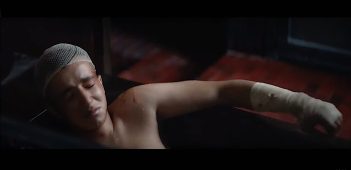
Foroughi centers her story on a restless Iranian 17-year-old teenager named Omid (meaning “Hope” in Persian) who attempts to resist the control of adult guardians in a society that cramps the freedom of young people. At the very beginning, an aggressively contrasting sequence of soundtrack cues establishes the separate worlds of 17-year-old Omid (Mehdi Ghorbani), dancing in an orange-lit club to Duke Dumont’s electronic banger “Ocean Drive,” and his mother Leili (Leili Rashidi, who stars in the director’s first film “Ava”), driving to the full-volume surge of Mozart’s Mass in C Minor – shown to be diegetic only when her son, slouching into the car beside her, promptly switches it off. A sort of mutual sullenness bristles between them as they hit the road, driving from their home in Tehran to an elite residential estate on the Caspian Sea, where talented swimmer Omid is set to take part in a critical swim meet, with a place in the national championships at stake.
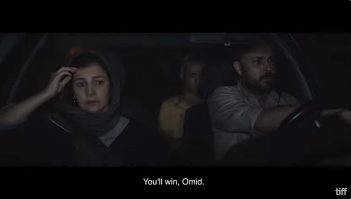 The swimming competition in question feels at first like a minor irritant for young Omid. He has an invitation to compete but is running late for the registration at a resort town in Iran, arriving with his mother Leili from their home in Tehran. Omid’s uncle Saadi (Alireza Kamali), who helped raise his nephew in the absence of his estranged father, is already at the competition, and warns Omid of complications. And Kamran (Milad Mirzaei), the temporary director of the beach club behind the competition, informs the family that the invitation is not good enough, and Omid will not be able to register. Almost Kafkaesque scenes involving the attempts to register Omid feel reminiscent of the child custody case at the heart of Asghar Farhadi’s “A Separation.” Still, the stakes seem so low viewers might wonder why much of the first act of “Summer With Hope” goes to such lengths to detail Omid’s struggles to register for the competition.
The swimming competition in question feels at first like a minor irritant for young Omid. He has an invitation to compete but is running late for the registration at a resort town in Iran, arriving with his mother Leili from their home in Tehran. Omid’s uncle Saadi (Alireza Kamali), who helped raise his nephew in the absence of his estranged father, is already at the competition, and warns Omid of complications. And Kamran (Milad Mirzaei), the temporary director of the beach club behind the competition, informs the family that the invitation is not good enough, and Omid will not be able to register. Almost Kafkaesque scenes involving the attempts to register Omid feel reminiscent of the child custody case at the heart of Asghar Farhadi’s “A Separation.” Still, the stakes seem so low viewers might wonder why much of the first act of “Summer With Hope” goes to such lengths to detail Omid’s struggles to register for the competition.
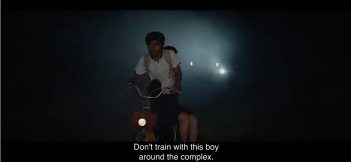 Two external factors are immediately noted: Omid’s unseen father threatens to reclaim his wife should the boy not win the competition, and Omid’s participation would also defer his obligatory military service. But there are also much deeper reasons behind Omid’s banishment from the competition, and his struggles to claim his place, that slowly and subtly make themselves apparent during the course of “Summer With Hope.” Key to those reasons is Omid’s friendship with swimming instructor Mani (Benjamin Peyrovani), who helps the young swimmer in advance of the competition. Mani claims that Omid will be able to covertly participate in an open water event; Omid’s natural discipline is indoor swimming, however, and he needs to go through some rigorous training in advance.
Two external factors are immediately noted: Omid’s unseen father threatens to reclaim his wife should the boy not win the competition, and Omid’s participation would also defer his obligatory military service. But there are also much deeper reasons behind Omid’s banishment from the competition, and his struggles to claim his place, that slowly and subtly make themselves apparent during the course of “Summer With Hope.” Key to those reasons is Omid’s friendship with swimming instructor Mani (Benjamin Peyrovani), who helps the young swimmer in advance of the competition. Mani claims that Omid will be able to covertly participate in an open water event; Omid’s natural discipline is indoor swimming, however, and he needs to go through some rigorous training in advance.
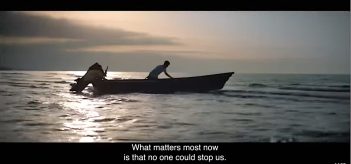 What makes this film so interesting is how it morphs into something entirely different than a lightweight examination of bureaucracy and the oppression of youth in modern Iran. The central theme of “Summer With Hope” is never directly addressed throughout the film, with director Foroughi instead allowing the audience to only infer the true nature of what has transpired. The exact nature of the relationship between Omid and Mani remains shrouded. Two successive climactic revelations – involving Mani’s wife (Sanaz Najafi) and local authorities – take place without the participation of the audience, the filmmaker instead relying on the audience to infer what is being said. “Summer With Hope” is a subtly ambiguous subtly for a movie set and shot in modern Iran, which has some of the world’s most discriminative laws against homosexuality.
What makes this film so interesting is how it morphs into something entirely different than a lightweight examination of bureaucracy and the oppression of youth in modern Iran. The central theme of “Summer With Hope” is never directly addressed throughout the film, with director Foroughi instead allowing the audience to only infer the true nature of what has transpired. The exact nature of the relationship between Omid and Mani remains shrouded. Two successive climactic revelations – involving Mani’s wife (Sanaz Najafi) and local authorities – take place without the participation of the audience, the filmmaker instead relying on the audience to infer what is being said. “Summer With Hope” is a subtly ambiguous subtly for a movie set and shot in modern Iran, which has some of the world’s most discriminative laws against homosexuality.
Foroughi grants us selective access to the relationship of Omid and Mani, maintaining an ambiguity that ultimately proves the truth, at least in legal terms, immaterial in the face of ugly societal prejudice. Omid’s athletic prowess and untamed spirit are mostly demonstrated in adrenalin-pumping scenes of him running away – whether from violent pursuers in an illicit gym break-in, whether from violent pursuers in an illicit gym break-in, or from his responsibilities in a witching-hour joyride on the beach, glitteringly lit by distant, threatening city lights.
Award-winning Iranian Canadian filmmaker Sadaf Foroughi began her career in 2003, writing/directing short films and documentaries, and creating video art pieces, exhibited and screened at various film festivals and cultural venues worldwide, such as Berlinale. Sadaf Forougi co-wrote, produced, and starred in Kiarash Anvari’s feature debut, “The Poet and the Oak,” which had its world premiere in the Bright Future Competition section of the 2017 Rotterdam International Film Festival. Her debut feature as a writer/director/producer, “Ava” premiered at the 2017 Toronto International Film Festival, winning the FIPRESCI award in the Discovery section, and received an honorable mention as best debut Canadian feature film. As previously mentioned, the Iranian government is very unhappy with her film and has banned her from working in Iran in a period of time.